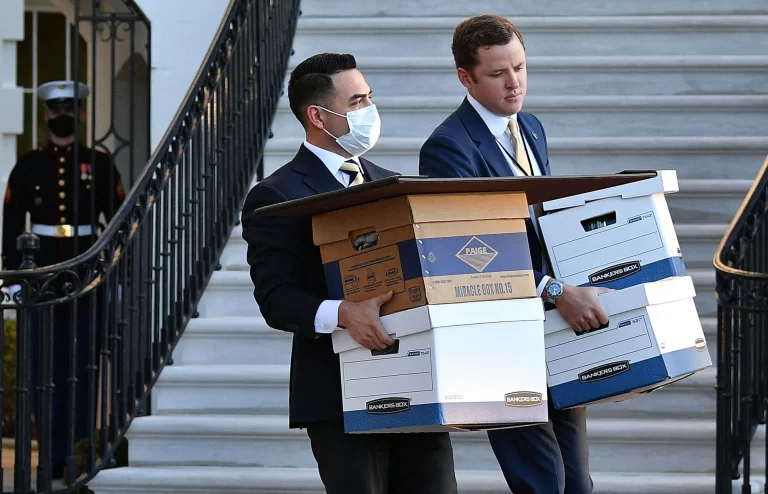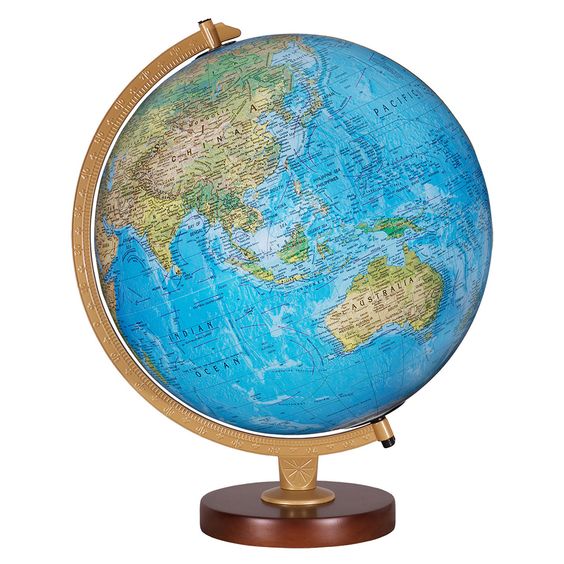
Some Secret Service call logs, phone texts and Pentagon documents are missing since the Trump left the White House.
Under American law, all correspondence, texts, emails, even presidential notepad jottings are the property of the US government. On the day that the president leaves the White House all the above must be handed over to the National Archives. Failure to do so is a criminal offense punishable with a major fine and/or three years prison time.
By Tom Arms
The United States is facing a major question: Does political support trump the rule of law?
There is no doubt that Donald Trump has political support from a large proportion of the American population. He is virtually a shoe-in for the 2024 Republican presidential nomination.
Whether or not he is guilty of one of any number of crimes is immaterial to his base of supporters. Trump represents small government libertarian-minded conservative America. The values that he has come to embody are seen as more important than any number of words in any number of law books.
He has the support “of his people” and that lifts Trump to the far edge of the reach of the long arm of the law. Any attempt to argue otherwise, or to enforce the law, is jackboot Nazism and an establishment conspiracy to thwart the will of the people.
Given that many of Trump’s people are gun-toting Second Amendmenters, using the law against the former president risks the serious danger of violence.
Attorney General Merrick Garland is all too aware of the need to balance political reality with the rule of law. Donald Trump is a special case. No person is above the law, but realpolitik means that some people are on its edges. If the Department of Justice—or anyone else—is going to take any kind of legal action against the former president then it must be totally convinced of his guilt well beyond a reasonable doubt– and then some.
That is why Garland has so far refused to pursue the serious allegations made against Trump by the congressional investigation into the Capitol Hill Riots. The committee has unearthed some seriously damning information. But so far it is—in legal terms—largely hearsay. This is because Trump has refused to testify or allow any of his staff to do so.
If Donald Trump appeared in court charged with an offense related to the 6 January riots then he would simply refuse to incriminate himself under the terms of the Fifth Amendment. He has done it before. This week in fact. White House staff would do the same. Without their unperjured testimony the prosecution would find it difficult to prove their case.
Trump would go free and claim that he had been found innocent. That would be another lie. The charges would be unproven, which is a different matter altogether. But that wouldn’t matter. The ex-president would shout witch hunt, conspiracy, and Nazi justice and he and his supporters would demand revenge, or what they would call “justice.”
But taking material from the White House, or destroying records, is another—more easily provable matter altogether. All you have to do is find the records some place other than where they are supposed to be and prove that the former president is responsible for moving them to the other location.
Under American law, all correspondence, texts, emails, even presidential notepad jottings and doodles are the property of the US government. On the day that the president leaves the White House all the above must be handed over to the National Archives. Failure to do so is a criminal offense punishable with a major fine and/or three years prison time. Finally—and here’s the kicker—the offender is barred from ever again holding elected office.
It is known that some Secret Service call logs, phone texts and Pentagon documents are missing. Photographs have been published of torn papers in the toilet bowl. They were covered in the Trump scrawl. Fifteen boxes of documents were moved from the White House to Trump’s Florida base at Mar-a-Lago when Donald left the White House. For nearly two years, the National Archives, has been politely asking for their return. Some were sent back—but not all.
The demand for the return of those papers does not emanate from a Democrat-controlled committee or from the FBI. It comes from the National Archives and Records Administration whose director is career archivist Debra Steidel Wahl. She is not interested in whether the missing papers implicate Donald Trump in any misdeeds. Her job—her interest—is in maintaining all records pertaining to the Trump Administration so that future historians can compile accurate accounts.
So, she went to the FBI, and asked them to retrieve the missing records. They asked her for proof that the records were Mar-a-Lago. She gave them what proof she had. They took that to a federal judge who was convinced that there was a strong enough case to issue a search warrant. And rest assured, because it was Donald Trump, he was going to have to be very convinced.
And guess what, the FBI left Mar-a-Lago with several boxes. How many and what they covered no one is saying; not Trump, not Biden, not Garland and not the FBI. But, once again, the content of the records is immaterial. The only relevant legal point is that White House records were in a place where they should not have been. It is worth noting at this stage that the notorious gangster Al Capone did not go to prison for murder, racketeering, theft or any other salacious felony. He was convicted of the rather pedestrian crime of tax evasion.
Capone, however, was not President of the United States. He did not enjoy a 40 percent approval rating in the opinion polls. He could not galvanize a base of tens of millions to demonstrate and perhaps—quite literally—fight. But does this put Donald Trump beyond the law? If it does then it would have far-reaching consequences that are just too awful to contemplate.
 World Review
World Review
- The successful missile attack on the Russian arms depot on the Crimean Peninsula was a major boost for the Ukrainians. It may also have created a major problem. So far the Ukrainians have refrained from attacking Russian territory. This is a bit like fighting with one hand tied behind the back, but they have been told by their NATO quartermasters to restrain themselves due to a fear of provoking an escalation that would result in NATO and Russian troops facing each other in a possible World War Three scenario. Donetsk and Luhansk are not Russian territory. They are—according to the Russians—independent sovereign republics which have seceded from Ukraine with Russian help. Crimea, however, is a different kettle of fish. The Russians annexed it in 2014. It matters not that only 14 countries have recognized the annexation. Russia regards Crimea as Russian and therefore the attack was on Russian territory. Interestingly enough, the Ukrainian government is refusing to take credit for the attack. It is not denying responsibility either. Meanwhile concern is growing for the safety of the Zapororizhzia nuclear power plant. The Russians continue to use the plant as a base from which to launch artillery and missile barrages and there are reports that technicians at the plant are being forced to work at gunpoint. The International Atomic Energy Agency is still trying—unsuccessfully–to gain access to conduct safety inspections and UN Secretary General Antonio Guterres has called for a demilitarized zone around the plant.
- Are sanctions against Russia working? A bit, but not enough. The latest figures out show that the economy shrank 5.7 percent in the second quarter of 2022, slightly more than the first quarter drop so that the total shrinkage for 2022 is ten percent. There appears to have been nil impact on the energy sector. Any drop in the quantity of oil and gas exports has been more than accommodated by a rise in prices. Manufacturing has been hit by a drop in imports of components, but Russian industrialists appear to be discovering work arounds. The big hit has been on the service industries, especially financial services with overseas connections. Inflation, however, could be a bigger long term problem for Putin. It is currently running at 17.5 percent and rising. Of course, his European and American opponents are suffering as well. The US economy grew at only 0.5 percent in the second quarter and this was after shrinking 1.6 percent in the first. Germany is hanging in there with 1.4 percent growth in the first quarter of 2022. Inflation in Europe and America has either hit double figures or will within weeks or months. Britain is one of the worst hit with a recession predicted for all of 2023. Its unions are lining up for industrial action. But spare a thought for other parts of the world. Turkish inflation is at 79.6 percent and expected to reach three figures by next year or earlier. Argentina is 70 percent, the worst in three decades. The outlook for the developing world is bleak to stark. Stagnation and contraction in the developed economies means a shrinking market for their goods; less money for investment and cuts in aid. Hungry bellies leads to social unrest. The World Bank and IMF have identified 40 countries where disturbances could break out next year as a result of failing economies.
- Europe is suffering a drought. Some meteorologists are predicting that it will last until October. If so it could go on record as the worst drought in 500 years, and the damage to the economy will be devastating to a continent already reeling from the 2008 banking crisis, the coronavirus pandemic, Ukraine war, supply chain bottlenecks. Inflation, and energy shortages. Water is so much more than something which used to make tea, water the plants and bathe. It is vital to a whole range of industries. In fact, it is estimated that only 11 percent of water is used for household purposes. The bulk of it, 70 percent, goes to agriculture, both crops and livestock. Nineteen percent is used by industry with the big users being steel, mining, chemicals, paper, power generation and, of course, the drinks industry. Water is also a vital component of Europe’s transport network. The continent has a large complex of rivers and canals along which moves millions of tons of goods. The Rhine and Danube alone carry 50 million tons of goods on nearly 2,000 vessels. Dropping water levels have made this rivers virtually commercially useless.
- Angela Merkel started it and her successor as German Chancellor, Olof Scholz, has continued the tradition of a summer press conference before disappearing for his annual holidays. This year’s Berlin event focused on Ukraine, energy, economic problems and the pro-Russian activities of one of his predecessors, Gerhard Schroeder. Scholz was slow to jump on the “we love Ukraine” bandwagon, but now he is fully on board with military and political support. The invasion of Ukraine is a war crime and Putin is a war criminal,” he told reporters. Scholz promised tax relief for those hit by inflation and denied that the country’s economic problems would lead to civil unrest. The German Chancellor said that as part of the government’s efforts to diversify energy supplies it was proposing a gas pipeline to Portugal through France and Spain. Scholz was diplomatically circumspect about Schroeder who is under attack for his pro-Russian position. The former chancellor was instrumental in negotiating the Nordstream 2 pipeline which has now been blocked, is a director of Gazprom and recently met with Vladimir Putin. His solution to the energy crisis? Open Nordstream 2.
__________________
 Tom Arms is the foreign editor of Liberal Democrat Voice and the author of the recently published “America Made in Britain.”
Tom Arms is the foreign editor of Liberal Democrat Voice and the author of the recently published “America Made in Britain.”